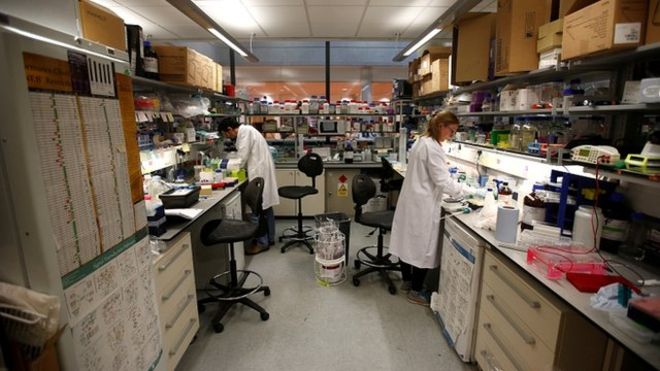
University research should have more impact with the wider public, says a review of how billions of pounds of UK research funding is awarded.
Economist Lord Nicholas Stern has published a review of how to measure the quality of university research.
He also wants all research staff to be assessed, rather than allowing universities to submit their own selection of academics.
Research is vital to economic growth, says Universities Minister Jo Johnson.
Lord Stern’s independent review examined the mechanism for measuring university research – the research excellence framework (REF) – which is used to determine the allocation of funding.
In 2015-16, this was worth £1.6bn to universities and the ratings from the REF are used to decide funding for the following five years or more.
The next round of assessments will be used for allocating funding from 2020 – and could be even more significant for universities worrying about the future of European Union research funding.
Lord Stern, president of the British Academy, says he wants a wider interpretation of research “impact” so that it shows “influence on public engagement and culture”.
He also wants to stop universities from playing the system to appear higher in the rankings.
He is recommending that all research staff should have to submit work for assessment, rather than allowing universities to put forward a small selection of their academics.
There were warnings of universities seeking to artificially boost their position by recruiting high quality researchers shortly before the date of the assessment.
Lord Stern’s review also wants to reduce the bureaucratic burden. The last round of the information-gathering process, completed in 2014, cost £246m to administer.
Wendy Piatt, director general of the Russell Group, said assessing all research staff “will be helpful in minimising the risks of game-playing”.
But Maddalaine Ansell, chief executive of the University Alliance group of universities, said the assessment process “must not just reward universities with the highest numbers of research-active staff”.
She said that there could be significant variations in how much time staff spent on research, when some staff might be more engaged with teaching or on contracts with business.
Pam Tatlow, chief executive of the MillionPlus group of universities, said the recommendations would encourage staff to be focused either on research or teaching, which would “drive a further wedge between teaching and research”.
But she welcomed the suggestion that impact “should be more broadly defined”.
London challenge
In the 2014 research rankings, London universities were found to be challenging the dominance of Oxford and Cambridge.
The London School of Economics had the highest proportion of world-leading research, followed by Oxford, Cambridge, Imperial College and University College London.
The biggest financial winners from the 2014 results, based on the research of 52,000 academics, were forecast to be Oxford, University College London and Cambridge.
The government also has plans to introduce a parallel system for measuring the quality of teaching, called the teaching excellence framework (TEF).
These teaching assessments will be linked to allowing universities in England to charge higher tuition fees.
Mr Johnson said he welcomed proposals for the research excellence framework that could “reduce the burdens on academics” and which could make improvements on previous assessments.
“Lord Stern recognises the advantage that our world-class research base brings to the UK and the key role our universities play in delivering high-quality teaching, driving productivity and economic growth,” he said.
[Source:- BBC]







